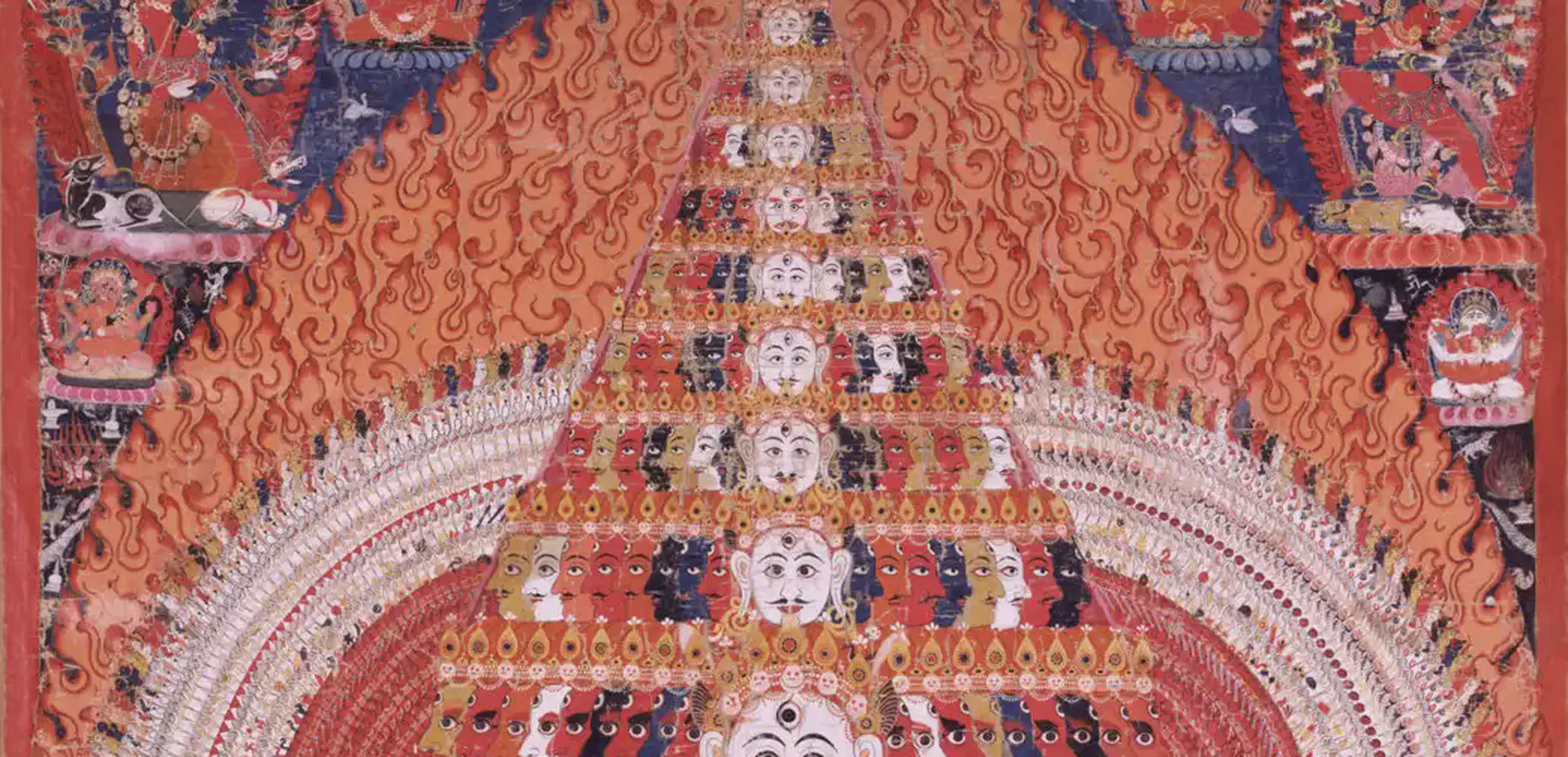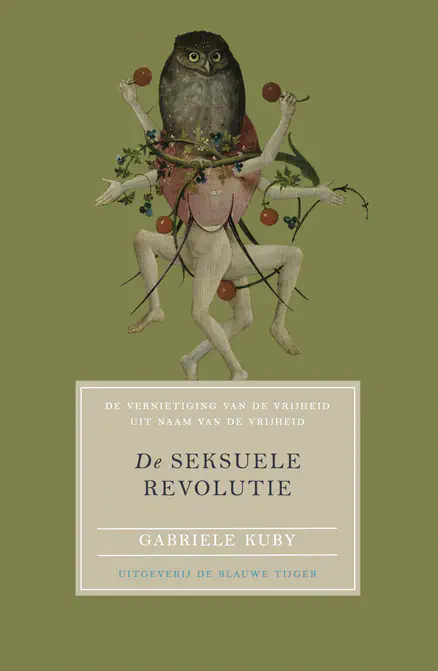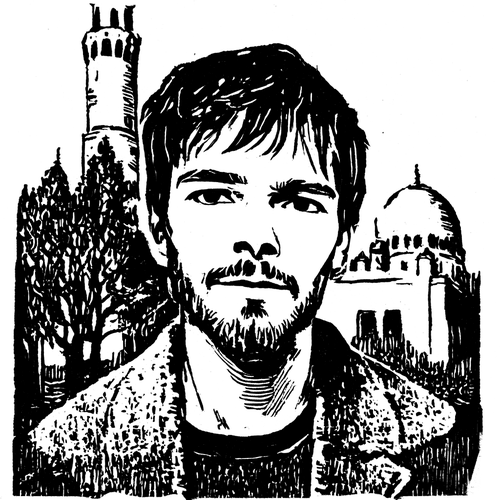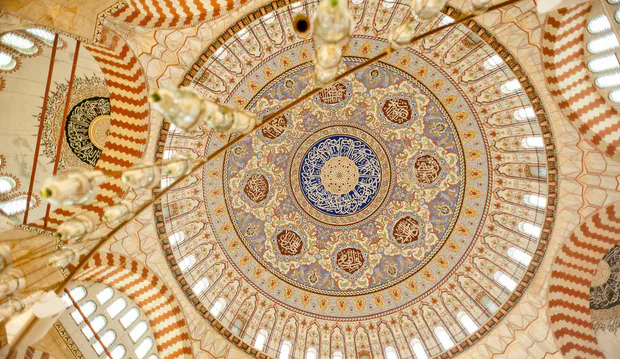Naar het einde en daar voorbij!
Gedachten over het Onbegrensde
Religie
Dit artikel gaat over enkele interacties met het idee van het onbegrensde, het eindeloze, oneindigheid, en enkele logische consequenties van deze concepten en de mogelijke implicaties voor theologie.
Het bepaalde en het onbepaalde
Het eerste geval deed zich voor bij het bepophkijken van een video van Aarvoll,1 waarin hij het volgende idee naar voren brengt:
If by finite we mean any kind of limitation whatsoever, then we can’t say that the number line is infinite, because even though it is unending, it is only infinite within the dimension that it has to operate with — the natural number — it is still finite insofar as you are not going to have a “pig”, like a pig is not one of the numbers. So you don’t have the pig, therefore it is not infinite because there is a limitation in that the numbers don’t include pigs.
Op het eerste gezicht lijkt dit misschien een beetje onnozel, maar bij nader inzien is dit een steekhoudende kritiek op de betekenis van het onbegrensde. René Guénon heeft over dit probleem een hoofdstuk geschreven in zijn boek The Metaphysical Principles of the Infinitesimal Calculus, getiteld Infinite and Indefinite, waarin hij dit “probleem met het onbegrensde [infinite]” oplost door het begrip van het onbepaalde [indefinite] te introduceren. Hij beschrijft het onbegrensde als dat zonder enige vorm van beperking, en dat wil zeggen, God. Bovendien kan er maar één onbegrensde zijn, want zogenaamd verschillende onbegrensden zouden elkaar noodzakelijkerwijs begrenzen en dus onvermijdelijk tenietdoen.2
Elke vorm van “oneindigheid” of “onbegrensdheid” die begrensd is, is niet het onbegrensde, maar het onbepaalde. De Scholastici hadden het vergelijkbare concept van infinitum absolutum (het absolute oneindige) en infinitum secundum quid (het oneindige in een bepaald opzicht). René Guénon legt het begrip van het Onbegrensde [infinite], het bepaalde [finite] en het onbepaalde [indefinite] en hun respectievelijke oorsprong als volgt uit:
The finite necessarily presupposes the Infinite — since the latter is that which comprehends and envelops all possibilities — the indefinite on the contrary proceeds from the finite, of which it is in reality only a development and to which it is consequently always reducible, for it is obvious that whatever process one might apply, one cannot derive from the finite either anything more or anything other than that which was already potentially contained therein. To take again the example of the sequence of numbers, we can say that this sequence, with all the indefinitude it implies, is given to us by the law of formation, since it is from this very law that its indefinitude immediately results; now this law consists in the following, that given any number, one can form the next by adding a unit. The sequence of numbers is therefore formed by successive additions of the unit to itself, indefinitly repeated, which is basically only the indefinite extension of the process of formation for any arithmetical sum; and here one can see quite clearly how the indefinite is formed starting from the finite.
Paradox van almacht
Nu we deze schijnbare tegenstrijdigheid, die eerder van semantische dan van metafysische aard lijkt te zijn, hebben opgelost, gaat Aarvoll verder met te verklaren:
When we are discussing the term [infinite], we are asking “does this apply to the universe?”, and if it does apply, there are all sorts of contradictions that we’re going to run into immediately; one of them being, “can the infinite be finite?”… No, clearly that violates the law of identity, but then you are saying “the infinite is limited to the metalogical laws”. This is really just a variant of the problem of omnipotence; “can God create a boulder so large he can’t lift it?”. That is saying, is the omnipotent force capable of rendering itself not omnipotent? Can omnipotence negate its identity? or is it restricted by its identity and therefore not fully omnipotent because it can’t overcome that identity.
Ik had een discussie met iemand over dit probleem waarin deze persoon een paar bezwaren naar voren bracht over de manier waarop de vraag is geformuleerd, namelijk dat de vraag zelf tegenstrijdig is — “kan het oneindige eindig zijn?” is gelijk aan “kan A gelijk zijn aan niet A?”, een vraag die alleen al door de manier waarop hij is geformuleerd de wet van de identiteit doet schenden — en dat daarom het antwoord ook tegenstrijdig moet zijn. Ik denk echter dat hier een vergissing wordt gemaakt, namelijk dat de definitie van het onbegrensde datgene is wat geen begrenzing kent, en dat het onbegrensde alleen aan zijn definitie kan voldoen als datgene wat geen begrenzing kent niet beperkt wordt tot het hebben van geen begrenzing, anders zou het namelijk begrenst zijn. Nogmaals, het hele punt van het concept van het onbegrensde is dat het zijn eigen identiteit moet ontkennen om trouw te blijven aan zijn definitie en betekenis, anders zou het immers gewoon begrensd zijn. Het is dus niet de manier waarop de vraag is geformuleerd die paradoxaal is, maar eerder het concept van het onbegrensde zelf, zoals Aarvoll zelf ook al zegt in het vorige citaat, “clearly that [the infinite] violates the law of identity”.
De Reactionair
Boekenwinkel
Ondek onze grote collectie boeken, zoals De seksuele revolutie, in onze boekenwinkel.

In het boek Whats is Sufism? van Martin Lings wordt deze paradox uitvoeriger uiteengezet, zij het iets anders, waarbij God de naam al-Bā’in (het verborgene, het ongemanifesteerde, het innerlijke), ook de naam aẓ-Ẓāhir (het manifest, het evidente, het uiterlijke) draagt, en de reactie van een heilige die op deze variant van de paradox van de almacht stuitte:
For the mind alone and unaided it is impossible to resolve into Oneness the duality of Creator and creation. The already quoted Moroccan Shaykh, al-‘Arabī ad-Darqāwī, tells us in his letters how one day, when he was absorbed in the invocation, a persistent inward voice kept repeating to him the verse of the Qur’an “He is the First and the Last and the Outward and the Inward”. To begin with paid no attention and continued his own repetition of the Name. “But finally” — to quote his words — “since it would not leave me in peace, I answered it: As to His saying that He is the First and the Last and the Inward, I understand it; but as to His saying that He is the Outward, I do not understand it, for we see nothing outward but created things.” Then the voice said: “If by His words and the Outward anything other than the outward that we see were meant, that would be inward and not outward; but I tell thee and the Outward.” And I realised that there is no being but God nor anything in the worlds of the universe save Him Alone, praise and thanks be to God!”
Het traditionele antwoord op deze paradox ligt, zoals Martin Lings ons zegt, boven het domein van de rede en de logica:
Every sound mind can see that from the point of view of orthodoxy this commentary constitutes an overwhelming ‘proof’ of the Oneness of Being because it demonstrates, as with a lightning flash of clarity, that this doctrine can only be denied on pain of the heresy of implying that God is subject to change. But the mind cannot understand how Being can be One any more than it can understand how God can be the Outward as well as the Inward; and in accepting these truths theoretically it brings itself to the extreme limit of its own domain. We are here at the parting of the ways: the exoterist will involuntarily recoil, reminding himself and others that to dabble in theological speculation is strongly discouraged; but the virtual mystic will recognise at once that what lies before him is something other than the domain of dogmatic theology, and far from drawing back he will seek to escape from the apparently firm ground of his purely mental standpoint at the risk of being out of his depth.
Het antwoord op deze paradoxen, die boven het domein van de rede en de logica vallen, zou passend zijn, want hoe kan het Onbegrensde beperkt worden door de metalogische wetten, hoe kan het ingekapseld worden door onze eindige geest en hersenspinsels?
Apofatische theologie
Dit brengt ons bij de apofatische theologie; elke poging om God, of het Onbegrensde, te definiëren of te beschrijven, is in feite een poging om te beperken. Proberen het Oneindige, dat wat geen beperkingen heeft, te beperken met rede en logica of op welke andere manier dan ook, is duidelijk onmogelijk en absurd zoals we hebben gezien met ons voorbeeld van de “paradox van de almacht”. Proberen God te definiëren is altijd proberen Hem in te kapselen, wat onmogelijk is, dus we kunnen God alleen beschrijven door te zeggen wat Hij niet is (hoewel ook dit in zekere zin “pofatisch” is).3 Dit laat ons opnieuw zien dat het antwoord op ons probleem met het Onbegrensde wel eens buiten het domein van de rede zou kunnen liggen. Voor mij, iemand die gesocialiseerd is in atheïsme en rationalisme, is dit een concept dat moeilijk te aanvaarden is, maar juist de rede heeft mij tot dit punt gebracht.
Een god die volledig onbegrensd is en als zodanig alleen maar apofatisch benaderd kan worden, is moeilijk (of beter gezegd, misschien onmogelijk) te vatten, en enige interactie is onvoorstelbaar. Eerder dit jaar realiseerde ik me dat ik onbewust een persoonlijkheid aan God toebedeel. Het is duidelijk dat deze persoonlijkheid niet God is, maar een creatie van mijn verbeelding om Hem proberen te bevatten. Bij nader onderzoek ontdekte ik dat ik niet de eerste ben die zich dit realiseert (natuurlijk), Henry Corbin, een 20e eeuwse christelijke theoloog met een sterke belangstelling voor de Islam en andere tradities (tevens de Franse vertaler van Heidegger) noemde deze projectie van mentale constructies op God “idolâtrie métaphysique” (metafysische afgoderij). Rūmī schreef “Ga, streef naar betekenis, o vorm-aanbidder! Want betekenis is de vleugel van de vorm” in de 13e eeuw, en de Islamitische theologen Ibn ʿArabī en en Mullā Ṣadrā schreven ook uitvoerig over deze “afgoden van het geloof”, en verklaarden dingen als:
Most people do not worship God insofar as He is God. They merely worship the objects of their beliefs in accordance with what they have formed for themselves as objects of worship. In reality, their gods are those imaginary idols which they form and carve with the potency of their intellectual or imaginary beliefs.
En:
External idols are also only worshipped because of their worshipper’s belief in their divinity. The mental forms are the objects of their worship essentially, and the external forms are their objects of worship accidentally. Thus, the objects of worship of every idol-worshipper are nothing but the forms of his beliefs and the caprices of his soul, as has been alluded to in His saying, Have you seen the one who takes his caprice for his god? (Q 45:23). Just as worshippers of bodily idols worship what their hands have created, so too do those who have partial beliefs concerning God worship what the hands of their intellects have gathered.
Ibn ʿArabī ging zelfs zo ver dat hij verklaarde dat “er uitsluitend afgodaanbidders zijn”, dat aangezien elk geloof in God uiteindelijk een begrenzing of een verafgoodde opvatting van Hem is:
If God were to take people to account for error, He would take every possessor of a belief to account. Every believer has delimited his Lord with his reason and consideration and has thereby restricted Him. But nothing is worthy of God except non-delimitation… So He delimits, but He does not become delimited. Nevertheless, God pardons everyone.4
Aarvoll, Metaphysics of the Perennial Philosophy: 1. Order and Chaos. ↩︎
Want als ze dat niet deden, zouden ze begrensd zijn tot het niet begrenzen van de andere onbegrensde. ↩︎
Het boek Unsaying God: Negative Theology in Medieval Islam van Aydogan Kars beschrijft verschillende apopathische theologieën binnen de Islam, waarbij sommigen meer apofatisch zijn dan anderen. De Ismāʿīlis bijvoorbeeld gebruiken een dubbele negatie, waarbij zij eerst een attribuut ontkennen, en daarna de ontkenning zelf, bijvoorbeeld “God bestaat niet, en God bestaat niet niet”, waarbij de tweede ontkenning niet een dubbele ontkenning van het attribuut is, maar eerder een ontkenning van de ontkenning. ↩︎
Alle voorgaande citaten zijn afkomstig uit het uitstekende essay Beyond Metaphysical Idolatry: Mullā Ṣadrā on Mental Constructs of God. ↩︎







Tannhäuser
Interessant stuk, de discussie en de paradox van oneindigheid doet me denken aan de paradox van Immanuel Kant:
In the Critique of Pure Reason, A426–A434, B454–B462—Kant gives ‘proofs’ of conflicting theses—‘thesis’ and ‘antithesis’—about the extent of space and time. The ‘thesis’ says that:
a. the world has a beginning in time; and b. the world has a finite extension.
The ‘antithesis’ says:
c. the world has no beginning in time; and d. the world has infinite extension.
To a reasonable approximation, the ‘proofs’ run as follows: a. If the world has no beginning in time, then, up to any given moment, an eternity has elapsed: there has passed away an infinite series of successive states of things. But the infinity of a series consists in the fact that it can never be completed through successive synthesis. So it is impossible for an infinite series of successive states of things to have passed away: the world has a beginning in time. b. Since infinite extension cannot be thought in a single completed act of thought, the world can only be thought to have infinite extension through an act of synthesis in which completion is achieved via the addition of units. But an act of synthesis that achieved completion via the addition of units requires the lapse of an infinite amount of time—and we have already seen, in (a), that this is impossible. Consequently, it cannot be thought that the world has infinite extension. So the world does not have infinite extension. c. Something begins to exist only if there is a prior time at which it does not exist. Hence, if the world has a beginning in time, there must be an earlier time at which it does not exist: an empty time. But nothing can come into existence in an empty time, since there is no sufficient reason for the thing to come into existence in one rather than another part of empty time. So the world does not have a beginning in time. d. If the world has finite extension, then the world is contained in an unlimited empty space. Consequently, the objects in the world are not only related in space but also related to space. In particular, the relation of the world to empty space is a relation of the world to no object, i.e. to nothing. But there can be no such relation. So the world has infinite extension.
Ik zal niet veel kunnen toevoegen aan de discussie omtrent het onbegrensde; wel ben ik van mening dat de Grieken voor het vraagstuk een eeuwige wijsheid bezaten. De oorsprong van hun Mythologie begint met ‘Chaos’, dit interpreteer ik als het onbegrensde, dat wat niet bevangen kan worden en tegelijk alles en niets was. Hier verspilden de Grieken weinig woorden aan, elke poging tot beschrijving of definitie zou immers afbreuk doen aan wat ‘Chaos’ is, of (voor hun) betekende. Vanuit Chaos komt vervolgens het begrenzende, de context, datgene wat we kunnen ervaren en interpreteren. Ik zekere zin waren zij dus Goddelijk omdat ze hun evenbeeld creëerden (en aanbeden) uit ‘Chaos’, uit de oneindigheid. Nietzsche lijkt dit naar mijn interpretatie in zekere zin te onderstrepen met de uitspraak:
‘One must have chaos in oneself to give birth to a dancing star’.
Het onbegrensde moet in je zitten voor het streven naar de ‘Overman’.
External idols are also only worshipped because of their worshipper’s belief in their divinity. The mental forms are the objects of their worship essentially, and the external forms are their objects of worship accidentally. Thus, the objects of worship of every idol-worshipper are nothing but the forms of his beliefs and the caprices of his soul, as has been alluded to in His saying, Have you seen the one who takes his caprice for his god? (Q 65:23). Just as worshippers of bodily idols worship what their hands have created, so too do those who have partial beliefs concerning God worship what the hands of their intellects have gathered.
Interessant, is dit bedoelt als kritische noot? Mijn inziens correspondeert namelijk met de kracht van waar de Overman die ik eerder aanhaalde voor staat. Een geloof in de eigen virtues boven de ‘herd-morality’ uitstijgend.
My brother, when thou hast a virtue, and it is thine own virtue, thou hast it in common with no one. To be sure, thou wouldst call it by name and caress it; thou wouldst pull its ears and amuse thyself with it. And lo! Then hast thou its name in common with the people, and hast become one of the people and the herd with thy virtue! Better for thee to say: “Ineffable is it, and nameless, that which is pain and sweetness to my soul, and also the hunger of my bowels.” Let thy virtue be too high for the familiarity of names, and if thou must speak of it, be not ashamed to stammer about it. Thus speak and stammer: “That is MY good, that do I love, thus doth it please me entirely, thus only do I desire the good. Not as the law of a God do I desire it, not as a human law or a human need do I desire it; it is not to be a guide-post for me to superearths and paradises.
Enfin, wat ik een interessant vraagstuk vind is: hoe correspondeert dit artikel met de Traditionalistische leer? Je lijkt naar mijn interpretatie te concluderen dat elke poging tot aanbidding van God een vorm van ‘afgod aanbidding’ is, en dat je zelf ook onvermijdelijk karakteristieken wilt geven aan God, maar dit vervolgens ook afkeurt. Maar ondermijn je hier niet juist datgene waar Traditionalisme voor staat? Immers zou je met dit gegeven kunnen concluderen dat elke vorm van ceremonie of aanbidding afbreuk doet aan de Diviniteit, maar God vergeeft het ons. Wat houdt Traditionalisme dan nog in stand? Je zou zelfs kunnen concluderen dat niet geloven zuiverder is dan geloven. Mijn inziens leg je dan in feite een ‘Wasteland’ bloot en geef je de ruimte aan elke vorm van moderne scepticisme en postmoderne denken wat naar mijn (beperkte) kennis een antithesis is voor het Traditionalistische denken.